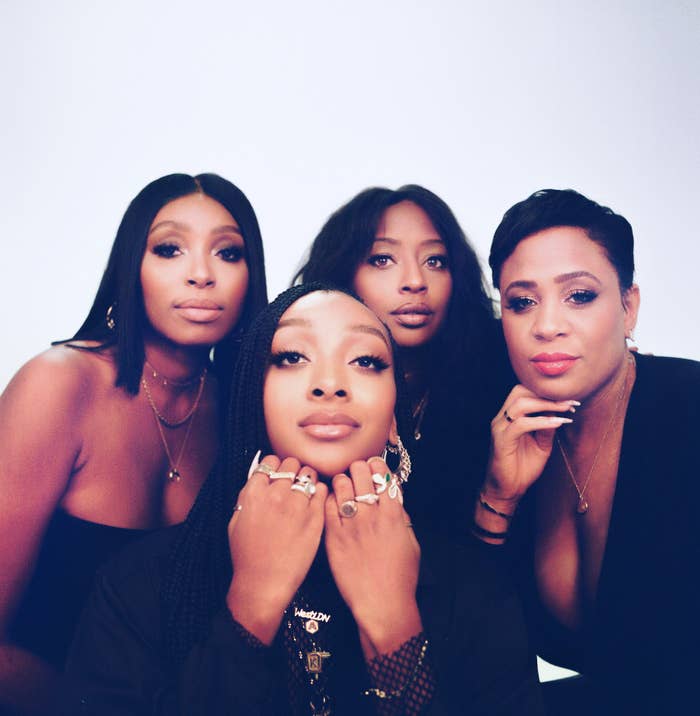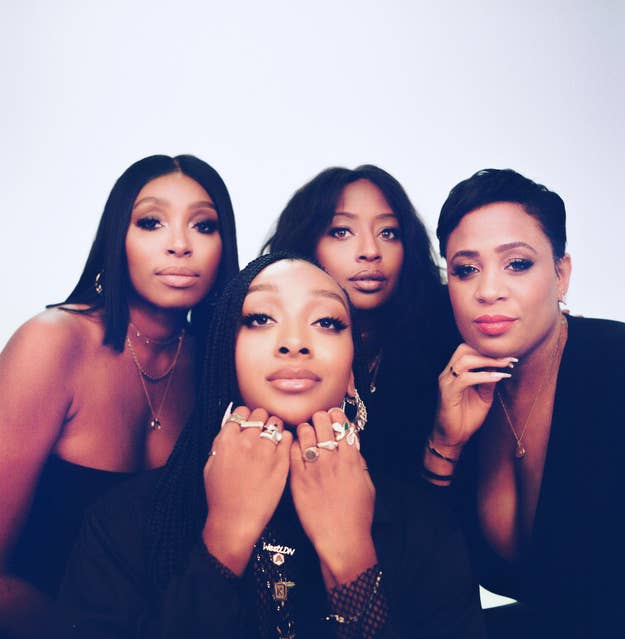
In June 2020—two months after the police murder of 46-year-old unarmed Black man George Floyd in Minnesota—industries worldwide had to face the stark realities of systemic racism as calls to tackle discrimination against Black people surged.
During the rise of Black Lives Matter, the UK’s Black Music Coalition (BMC) emerged as a key author in the story of the music industry pushing for change. The central focus was on systemic anti-Black racism, which left Black execs at a critical interval; they had no option but to reflect on their experiences of discrimination and racism while working in the music business (not an easy task).
Formed on a shared understanding united by experiences, commonalities, and transformative goals, the BMC’s mission is simple yet profound: to erase racial inequality in the industry and usher in equity and equality for Black artists, music execs, and communities. The organisation has an executive committee, which includes founder of Babychild Music Char Grant, A&R director Komali Scott-Jones, marketing director Afryea Henry-Fontaine and barrister Sheryl Nwosu, all of whom are deeply rooted within the UK music and culture scenes.
In the summer of 2020, the BMC sent out an open letter to the music industry, calling for pledges to show support and enact change. This then led to a wide-ranging manifesto defining long-term aims and providing a blueprint for a music industry redesigned by equality, equity, and inclusion.
Alongside their industry partners, the BMC are working on several initiatives at the moment, such as the Diversity Report—which takes stock of what has/hasn't changed in the industry since 2020—and their International Exchange Programme. Last year, the BMC also unveiled their debut exhibition, A Family Affair: Black British Dynasties In Music, at The Barbican, which celebrated the massive impact of Black British musical families.
We caught up with the Black Music Coalition team to learn more about the very important work that they continue to do.
“A key pillar of our work is paying it forward and doing our part to create a more equitable industry for the swathes of Black talent rising through the ranks in all areas.”—Komali Scott-Jones
COMPLEX: How is the Black Music Coalition structured to represent Black people in the music industry?
Char Grant: Our wider committee consists of some of the most formidable Black executives in the business, including Taponeswa Mavunga (director of Africa, Sony Music UK), Alec and Alex Boateng (co-presidents, 0207 Def Jam) and Glyn Aikins (co-president, RCA Records UK). They have all risen through the ranks, and we lean on them as the advice and steering hub of all we do as an organisation. In addition to that, alongside our introduction of membership, some of that committee—all of whom are founding members of the first roots of the organisation—will also now form part of our Executive Leadership Committee and use their specific industry experience to guide our future endeavours across the industry.
In what ways has the UK music industry perpetuated systemic racism, and how has the Black Music Coalition’s mission to challenge this racism been received by industry stakeholders and the wider public?
Komali Scott-Jones: It perpetuates it in many ways. I think, on a basic level, it’s built on ownership of creativity, recording masters, and other people owning your brand and image. And I guess, in that way, Black creativity is exploited and monetised, but the bulk of that profit doesn’t go to the Black artists or the Black teams that are sometimes surrounding them—it goes right back into the framework that is ultimately owned by a majority of white stakeholders. Within that staff framework, we’re also given different opportunities to move up through the business. In the last few years, mainly when Black British music has come into the forefront and the mainstream, there was an increase in Black staff members being hired. Still, many of those are at the junior internship level; some make it to mid-level, but you actually see a drop-off in the senior level of the business.
Sheryl Nwosu: There’s another, almost hidden way in which racism manifests itself with the music business, and that is in terms of remuneration of Black artists. Many a time, contractual arrangements and what they’re able to get from those contracts financially can be much less than their white counterparts.
How does the BMC aim to make an equitable space for the next generation to thrive in?
Komali Scott-Jones: A key pillar of our work is paying it forward and doing our part to create a more equitable industry for the swathes of Black talent rising through the ranks in all areas of the business. Our annual Excellence Honourees Awards, which last year included the likes of Jade Busola—an A&R at 0207 Def Jam and manager of the music producer London—and Mali Emeka, one of the youngest A&R managers in the country, currently at Atlantic Records UK. These are just two great examples.
Sheryl Nwosu: They, and the many other talented Black professionals, represent the next generation of talent, which is why they deserve not only this light to be shone on them but also inspire the end goal of our work, which is that execs like them are given full opportunity to flourish in their careers and not be overlooked, pigeon-holed, or have their careers stalled simply of systemic issues and racism which sees and has in the past seen amazing Black talent overlooked and thus left a swathe of stunted careers.
The BMC’s debut exhibition, A Family Affair: Black British Dynasties In Music, took place at the Barbican last year and contributed to the broader conversation about cultural representation and recognition of Black British artists and their families, particularly in the context of a predominantly white music industry. How was the process in putting together something so important for the culture?
Char Grant: It started as a conversation where even people within the Black British music community were learning about the relationships between music creators and family members that have been creating music for decades. And then even siblings and other units within our community that have been born out of music, who have individually gone on to have success—bringing that back together as a community and sharing those fantastic visuals and stories, I think it introduced the idea of dynasties and of excellence in a way that was hidden before. We plan to continue the exhibition and keep growing the breadth of the coverage of so many other artists, producers and their family members.
Komali Scott-Jones: Regarding continuing the conversation, the music industry is so London-centric and has been forever, as London is just the centre of everything. But that doesn’t mean to say that other Black people living in different parts of the UK shouldn’t also be able to see this history in towns and cities closer to them. We hope to collaborate with various galleries and spaces similar to the Barbican across the UK to share that conversation.
“We’re now opening memberships and general memberships to the Black Music Coalition as an organisation, which will allow execs of all backgrounds to join us as members to push the movement forward. I believe in representative bodies; I believe in people having a voice, and one of the great things that we can do once we get a load of members is to speak as an authoritative voice on behalf of music executives.”—Sheryl Nwosu
The exhibition featured photographs by Nathaniel Bailey and Dennis Morris, who have notable works documenting Black artists. How do these choices reflect the Coalition’s effort to amplify Black voices and perspectives within the arts and culture sphere?
Char Grant: I think it was important to us to reflect with Dennis Morris and his acclaimed heritage of shooting some of the most iconic Bob Marley images that we all love and bringing that legacy and heritage into the space. But also, a big part of what we do is paying it forward and helping people to discover new talent, especially British Black talent. Nathaniel Bailey is an acclaimed young photographer, and we believe in creating opportunities for our people.
How can the stories and experiences of Black British musical families, as showcased in the interviews, be used to critique and address issues of cultural appropriation and erasure within the music industry?
Sheryl Nwosu: Their historical experiences are worth looking at because, if you follow their experiences, within those experiences, you will uncover some of the blockades, the obstacles towards success, because I think with every person in our exhibition, all of them were superbly talented and they have gone on to have success at varying levels. One of the critiques would be: how is it that the Black Music Coalition, which only came about in 2020, decided to put on an exhibition such as this when those people have been around since forever? That, in itself, is a critique of the state of the music industry.
What steps will the BMC take next to ensure that their advocacy and celebration of Black British musical families continue to have an impact?
Sheryl Nwosu: We’re now opening memberships and general memberships to the Black Music Coalition as an organisation, which will allow execs of all backgrounds to join us as members to push the movement forward. I believe in representative bodies; I believe in people having a voice, and one of the great things that we can do once we get a load of members is to speak as an authoritative voice on behalf of music executives. I’m excited because membership speaks to one of our most significant aims, which is community building. Having a broad membership base also builds connectivity between music executives because this—the Black Music Coalition—is open to being their home. And so through our initiatives, and our social and professional events, we hope to bring those people together to mix, learn from each other and lean in on each other in a way that allows strength in numbers.
What are some of the initiatives the organisation is working on that you believe would have a lasting impact in this space?
Char Grant: We’re currently working on several exciting initiatives alongside our industry partners and allies to continue carving a path towards a more equitable industry, with projects such as our Diversity Report, which looks back at what changes there have been in the industry since 2020, and ongoing partnerships with the likes of Abbey Road, Amazon +44, and the BIMM Institute—all of whom have given us much-valued space for our cause—and our inaugural photographic exhibition, which we hope to spread across the country to showcase Black talent across generations. Other activations include rolling out our International Exchange Programme and building our community of members whilst continuing to add to the career and personal enhancing benefits BMC membership offers.
Sheryl Nwosu: Whilst membership is open to all execs across the industry, regardless of race, Black BMC members will have access to discounted therapy services, independent HR advice, studios and creative spaces, financial advisory services, and more. We are continuing to add to these benefits with levelling the playing field for Black execs at the forefront of our organisational mind.

